December 2021
Jennifer Kwan (?- Present)
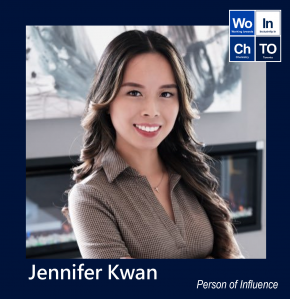
Dr. Kwan is a family physician in Burlington, Ontario. She completed medical school at the McMaster Michael G. DeGroote School of Medicine and trained in the McMaster Family Medicine Residency program in 2017 as one of their chief residents.
During the COVID-19 pandemic, Dr. Kwan has been an invaluable educator for the public. By creating daily accessible, transparent graphs and data visualizations on her twitter page, she has been a consistent resource to help the public understand the virus’s impact, as well as the importance of getting vaccinated in Ontario through science communication and literacy. She has been a spokesperson for aspects of the COVID-19 pandemic (e.g., the experience of Ontario medical providers, and the logistics of the COVID-19 vaccine roll-out across Ontario) for multiple media outlets.
Apart from this, she has advocated for personal protective equipment (PPE) for frontline workers in hospitals, as well as outpatient clinics, creating a centralized list of Ontario hospitals accepting donations. As one of the Directors of the Halton Region Chinese Canadian Association (HRCCA), she has assisted in the donation of over 5000 masks to local physicians’ offices and care providers during a time when resources were scarce, in order to keep medical offices open to care for patients. She also contributed to the PPE subgroup of Covid19Resources.ca and worked with the data visualization team on howsmyflattening.ca. As a co-founder of advocacy group Masks4Canada, she also advocated for the use of masks nationwide in high-risk settings, as well as for improved safety of essential workers & educators. Additionally, she is a co-founder of advocacy group Docs4LTCJustice, which brought to light the humanitarian crisis unfolding in long term care (LTC) homes and called for the Ontario government to take action.
November 2021
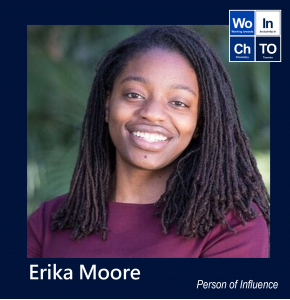
Erika Moore (?- Present)
Dr. Moore is currently an Assistant Professor of Materials Science and Engineering at the University of Florida, studying biomaterial design for immune cell tuning and disease modeling, specifically in blood vessel interactions. Her background is in biomedical engineering, receiving her BS from Johns Hopkins in 2013 and her PhD from Duke University in 2018. Additionally, the Moore Lab strives to actively build a more diverse network of future scientists through MRET, BlackInBME, AfroBioTech, and other initiatives. Among her many accomplishments, Dr. Moore was a Forbes 30 under 30 in Healthcare for 2021. She has been a Trustee on the Duke Board of Trustees.Dr. Moore is also passionate about running a financial literacy nonprofit, Moore Wealth Inc. This organization has a scholarship initiative for fourth year undergraduate students called ENG.A.G.E: Engineering Access for Graduate Education, which is to increase attendance of underrepresented minorities in STEM.
October 2021
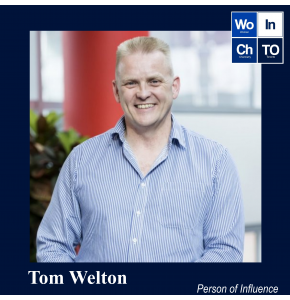
Tom Welton (1964-)
Prof. Tom Welton is a professor of sustainable chemistry at the Imperial College London. He received his PhD in 1990 from the University of Sussex, under the supervision of Prof. Kenneth Seddon. Welton's research interests include studying the structure and property of ionic liquids, as well as the processing and recycling of natural and synthetic polymers. Since joining the faculty of Imperial College London in 1993, Welton has received numerous honours including being awarded an Officer of the Order of the British Empire in 2017 for his services to diversity in education, and being president of the Royal Society of Chemistry since 2020. Welton is openly gay, and is an advocate for diversity and inclusion in the sciences, including supporting women and the LGTBQ+ community. He is also a L'Oreal-UNESCO For Women in Science male laureate of change.
July 2021
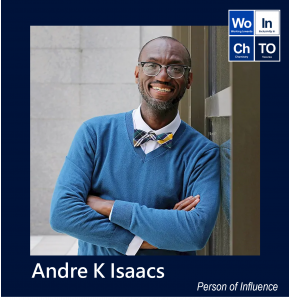
Andre K. Isaacs (? - Present)
Prof. Andre K Isaacs is an associate professor in chemistry at the College of the Holy Cross in Worcester, Massachusetts. A native of Jamaica, Isaacs received his PhD in chemistry from the University of Pennsylvania in 2011 and worked as a post-doctoral researcher in the Sarpong group at UC Berkeley until joining the faculty at the College of the Holy Cross in 2012. His research group focuses on copper-mediated organic chemistry reactions and strives to create an inclusive environment for all. Isaacs is a founding member of Outfront, the college's LGBTQ faculty and staff alliance, and is a passionate advocate for queer visibility and acceptance in STEM. You can follow him on twitter, instagram or TikTok @drdre4000.
June 2021
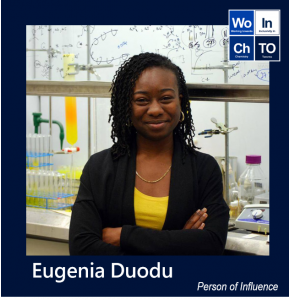
Eugenia Duodu (? - Present)
Dr. Eugenia Duodu is a notable chemist, advocate, and tech CEO. She obtained her HB.Sc. in Chemistry and Biology, as well as her PhD in Chemistry from our very own University of Toronto! She is the CEO of Visions of Science Network for Learning (VoSNL), a charitable organization that empowers youth from low-income communities through meaningful engagement in STEM fields and research. This organization works with Toronto Community Housing (TCH) and Peel Housing Corporation to serve over 500 youth from Grades 3 to 12 in 24 locations across Toronto, Mississauga, and Brampton. As well, she devotes her time to various community and global outreach initiatives and is a strong advocate for creating equitable opportunities to help youth reach their full potential.
May 2021
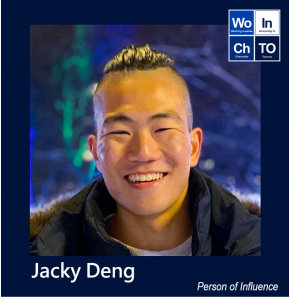
Jacky Deng (1995 - Present)
Jacky Deng (he/him/his) is a PhD candidate studying chemistry education at the University of Ottawa. He earned his B.Sc.H. in chemistry with a minor in psychology from the University of British Columbia, Okanagan. His PhD research focuses on identifying equitable ways to support chemistry students' abilities to make and justify decisions using scientific evidence and reasoning. Jacky is passionate about improving equity and inclusion in STEM education; he has hosted workshops inviting chemists and chemistry educators across North America to share ways to integrate anti-racism within chemistry teaching and research. At the University of Ottawa, Jacky has worked to improve equity and inclusion through initiatives focused on advocacy and education as President of the Chemistry and Biomolecular Graduate Students' Association and as a member of uOttawa's CWIC chapter. He has also been engaged in national EDI initiatives as a member of the Society of Teaching and Learning in Higher Education's EDI Task Force. Lastly, as a second-generation Chinese Canadian, Jacky actively works to highlight the unique and diverse challenges faced by the Asian American and Pacific Islander (AAPI) community in STEM and beyond. WICTO and CSU are very excited that Jacky will be hosting an antiracism workshop on Thursday, May 20th at 6pm EST. The workshop is open to undergrad students, grad students, and postdocs from all institutions. Sign up for the workshop, titled “Catalysts for Change: Tackling Racism and Beyond” here: https://workshop_21.eventbrite.ca
April 2021
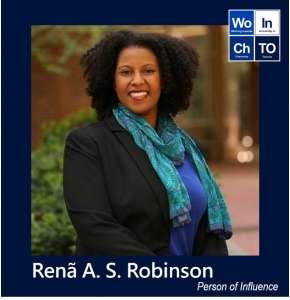
Renã A. S. Robinson
Renã A. S. Robinson is an Associate Professor of Chemistry at Vanderbilt University. She is known for her work in the field of -omics (proteomics and lipidomics), specifically the use of mass spectrometry to study aging, Alzheimer's disease, and sepsis. One aspect of her group's research is investigating the intersection of health disparities with race/ethnicity and social factors such as socioeconomic status.
Prof. Robinson received her B.S. at the University of Louisville, continued to acquire a Ph.D. in analytical chemistry under the supervision of Prof. David E. Clemmer at Indiana University, then completed a postdoctoral fellowship with Prof. Allan Butterfield at the University of Kentucky. Before joining Vanderbilt University as the Dorothy J. Wingfield Phillips Chancellor’s Faculty Fellow, Prof. Robinson was an Assistant Professor at the University of Pittsburgh. Throughout her time as a principal investigator, Prof. Robinson has received several awards in addition to being part of the C&EN Talented 12 Class of 2016.
Beyond the lab, Prof. Robinson advocates for expansion of STEM programs to racialized neighborhoods having personally benefited from the programs, camps and role models she encountered growing up. She is the President Elect for the National Organization for the Professional Advancement of Black Chemists and Chemical Engineers.
March 2021

Paula Hammond (1963 - Present)
Dr. Paula T. Hammond is the David H. Koch Chair Professor of Engineering at the Massachusetts Institute of Technology (MIT), and the Head of the Department of Chemical Engineering. She earned her PhD in chemical engineering in 1994 from MIT and completed a NSF postdoctoral fellowship in chemistry at Harvard. Her research focuses on the self-assembly of polymeric nanomaterials for nanomedicine and drug delivery applications. Over her career, Hammond has published over 320 papers and over 20 patents. She is also 1 of only 25 distinguished scientists to be elected into all 3 national academies: the National Academy of Sciences (2019), the National Academy of Engineering (2017), and the National Academy of Medicine (2016). Additionally, Hammond is the co-founder of LayerBio, Inc. and serves as a member of the Scientific Advisory Board of Moderna Therapeutics.
February 2021
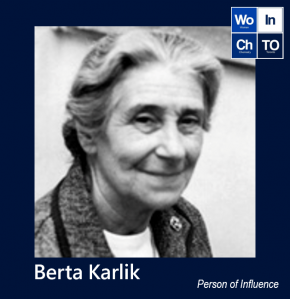
Berta Karlik (1904-1990)
Berta Karlik, born January 24, 1904 in Vienna, was an Austrian physicist who co-discovered the 85th element in the periodic table, astatine. Karlik studied math and physics at Vienna University and graduated with honours and a scholarship from the International Federation of University Women. With this scholarship, she was able to pursue research at London’s Royal Institution and Paris’s Curie Institute, working with fellow innovating women like Eva Remstedt and Lise Meitner. Berta Karlik then decided to return to Vienna in 1931 to work for the Institute for Radium Research, eventually becoming the director of the Institute following World War II. In 1956, she became the first female professor at the University of Vienna.
Working with her colleague Traude Bernert, Karlik was able to discover naturally-occurring radioactive astatine, the rarest naturally occurring element due to its incredibly short half-life. Unfortunately, Karlik and Bernert’s discovery was not fully recognized since it was conducted under German occupation in the Second World War and communication was challenging during this time.
In addition to discovering astatine, Berta Karlik also studied radiation therapy and developed crystallographic methods for analyzing hydrocarbons. She was inducted into the Academy of Sciences in 1973 and went on to become the Academy’s first female full member. Karlik was also a founding member of the Austrian Physical Society and an important member of the CERN planning staff. Moreover, she helped found the International Atomic Energy Commission and counselled the government on peaceful use of atomic energy. Berta Karlik continued to work at the Institute for Radium Research until her death on February 4, 1990.
January 2021
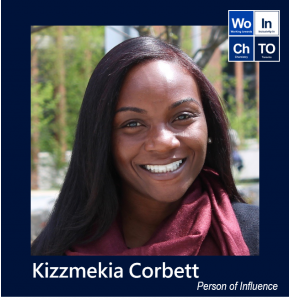
Kizzmekia Corbett (1968 - Present)
Dr. Kizzmekia Corbett is an American viral immunologist who works as a research fellow at the National Institute of Allergy and Infectious Diseases, National Institutes of Health in Bethesda, Maryland, USA. Dr. Corbett earned her Bachelor of Science degree from the University of Maryland Baltimore County, and her Ph.D. in microbiology and immunology from University of North Carolina at Chapel Hill. If her name sounds at all familiar, it’s because she has been a key player in the development of Moderna’s COVID-19 vaccine. Dr Corbett led the team that developed the vaccine along with her colleague Dr. Barney Graham. They partnered with Moderna to develop and test the vaccine, and it has now been approved for use in several countries. Since the onset of the pandemic, Dr. Corbett has been sharing a wealth of information related to COVID-19 and vaccine efficacy on her Instagram account. She advocates for the medical community to build trust with traditionally underserved populations such as the Black community, especially in relation to vaccines.
